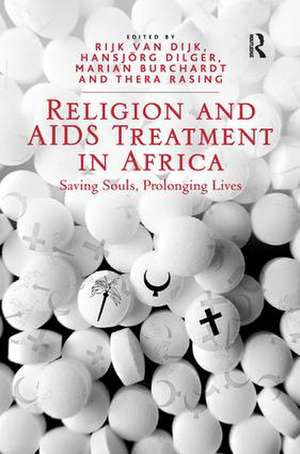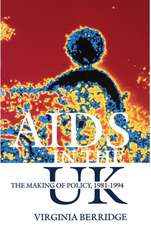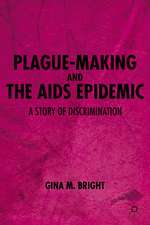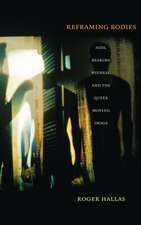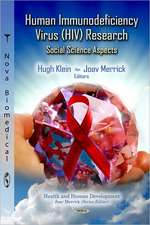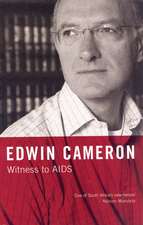Religion and AIDS Treatment in Africa: Saving Souls, Prolonging Lives
Autor Hansjörg Dilger Editat de Rijk van Dijk Autor Thera Rasingen Limba Engleză Paperback – 12 feb 2018
| Toate formatele și edițiile | Preț | Express |
|---|---|---|
| Paperback (1) | 323.23 lei 6-8 săpt. | |
| Taylor & Francis – 12 feb 2018 | 323.23 lei 6-8 săpt. | |
| Hardback (1) | 676.19 lei 6-8 săpt. | |
| Taylor & Francis – 18 sep 2014 | 676.19 lei 6-8 săpt. |
Preț: 323.23 lei
Nou
Puncte Express: 485
Preț estimativ în valută:
61.85€ • 66.14$ • 51.57£
61.85€ • 66.14$ • 51.57£
Carte tipărită la comandă
Livrare economică 17 aprilie-01 mai
Preluare comenzi: 021 569.72.76
Specificații
ISBN-13: 9781138547025
ISBN-10: 1138547026
Pagini: 320
Dimensiuni: 156 x 234 x 17 mm
Greutate: 0.45 kg
Ediția:1
Editura: Taylor & Francis
Colecția Routledge
Locul publicării:Oxford, United Kingdom
ISBN-10: 1138547026
Pagini: 320
Dimensiuni: 156 x 234 x 17 mm
Greutate: 0.45 kg
Ediția:1
Editura: Taylor & Francis
Colecția Routledge
Locul publicării:Oxford, United Kingdom
Cuprins
Contents: Introduction: religion and AIDS-treatment in Africa: the redemptive moment, Hansjörg Dilger, Marian Burchardt and Rijk van Dijk. Part I Agency, Subjectivity, and Authority: Fashioning selves and fashioning styles: negotiating the personal and the rhetorical in the experiences of African recipients of ARV treatment, Felicitas Becker; The logic of therapeutic habitus: culture, religion and biomedical AIDS treatments in South Africa, Marian Burchardt; ’A blessing in disguise’: the art of surviving HIV/AIDS as a member of the Zionist Christian Church in South Africa, Bjarke Oxlund; ’God has again remembered us!’: Christian identity and men’s attitudes to antiretroviral therapy in Zambia, Anthony Simpson. Part II Contesting Therapeutic Domains and Practices: Prophetic medicine, antiretrovirals, and the therapeutic economy of HIV in northern Nigeria, Jack Ume Tocco; ’Silent nights, anointing days’: post-HIV test religious experiences in Ghana, Benjamin Kobina Kwansa; The blood of Jesus and CD4 counts: dreaming, developing and navigating therapeutic options for curing HIV/AIDS in Tanzania, Dominik Mattes. Part III Emergent Organizational Forms in Times of ART: Societal dynamics, state relations, and international connections: influences on Ghanaian and Zambian church mobilization in AIDS treatment, Amy S. Patterson; The role of religious institutions in the district-level governance of anti-retroviral treatment in western Uganda, A.M.J. Leusenkamp; Negotiating holistic care with the ’rules’ of ARV treatment in a Catholic community-based organization in Kampala, Louise Mubanda Rasmussen; Notions of efficacy around a Chinese medicinal plant: Artemesia annua - an innovative AIDS therapy in Tanzania, Caroline Meier zu Biesen; Index.
Notă biografică
Rijk van Dijk is an anthropologist working at the African Studies Centre, Leiden and a professor in the study of religion and sexuality in Africa at the University of Amsterdam. He is an expert on Pentecostalism, globalization & transnationalism, migration, youth, and healing. He has done extensive research and published on the rise of Pentecostal movements in urban areas of Malawi, Ghana and Botswana. He is the author of Young Malawian Puritans (Utrecht, ISOR Press, 1993) and has co-edited 7 books. With Ria Reis and Marja Spierenburg he co-edited The Quest for Fruition through Ngoma (Oxford, James Currey 2000) and with Wim van Binsbergen Situating Globality. African Agency in the Appropriation of Global Culture (Leiden, Brill 2004). His current research deals with the religious, in particular Pentecostal, engagements with the domains of sexuality and HIV/AIDS in Botswana. Recently published articles entitled ’Gloves in times of AIDS: Pentecostalism, Hair and Social Distancing in Botswana’ (In: F. Becker ; P.W. Geissler (eds) Aids and Religious Practice in Africa, Leiden / Boston: Brill, Studies on Religion in Africa, 2009) and ’Marriage, commodification and the romantic ethic in Botswana.’ (In: Marleen Dekker & Rijk van Dijk (eds) Markets of Well-being. Navigating Health and Healing in Africa, Leiden: Brill, African Dynamics Series No. 9, 2010) are dealing with insights gained from this ongoing research. He is also the chair of the International Research Network on religion and Aids in Africa. In addition, he is the Editor-in-chief of the newly established journal African Diaspora. A Journal of Transnational Africa in a Global World which is published by Brill, Leiden, as of 2008. Hansjörg Dilger is a Professor of Social and Cultural Anthropology at the Freie Universität Berlin. He has conducted long-term fieldwork on HIV/AIDS and social relations in Tanzania, focusing on the dynamics of kinship and Neo-Pentecostalism in the context of rural-urban migrat
Recenzii
’In the early days of the HIV epidemic on the African continent, anthropologists studied how religion provided healing and care to AIDS patients in the quasi-absence of medical treatment. As antiretroviral drugs become increasingly available and biomedicine reclaims its therapeutic role, the authors of this remarkable series of ethnographical investigations reverse the perspective and ask a fascinating question: what does this massive and effective treatment do to religion, and how does prolonging the lives affect the religious imagination?’ Didier Fassin, Institute for Advanced Study, USA and author of Humanitarian Reason. A Moral History of the Present 'This volume is a welcome addition to this growing intersection of scholarship because it reveals the complex entangling of institutions, belief, and health inequities in shaping how hope and redemption are culturally articulated, but constrained by historical, social and economic factors.' Marginalia Review of Books
Descriere
This book critically interrogates emerging interconnections between religion and biomedicine in Africa in the era of antiretroviral treatment for AIDS. Highlighting the complex relationships between religious ideologies, practices and organizations on the one hand, and biomedical treatment programmes and the scientific languages and public health institutions that sustain them on the other, this anthology charts largely uncovered terrain in the social science study of the AIDS epidemic.
